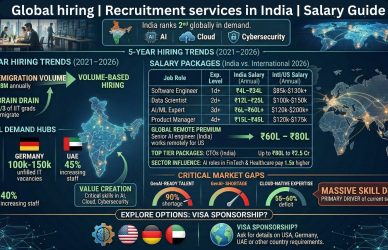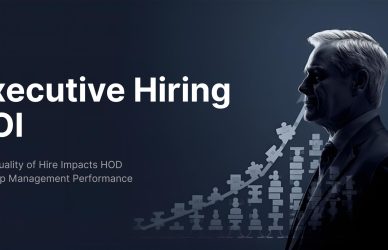Introduction: The Dynamic Shift in Executive Recruitment
Executive Recruitment: A Cornerstone of Success
Executive recruitment has long been the foundation of organizational success, playing a critical role in aligning leadership with business goals. However, in 2024, the dynamics of this industry have transformed, reflecting rapid advancements in technology and evolving business needs. The traditional reliance on networking and standard hiring practices has given way to innovative, data-driven approaches.
Key Drivers of Change
Several factors are driving this transformation. Artificial intelligence (AI) has revolutionized candidate sourcing and assessment, enabling recruiters to identify the best-fit leaders with precision. The emphasis on diversity and inclusion has also gained prominence, pushing organizations to prioritize equity in their leadership hiring strategies. Additionally, the rise of remote work has expanded the talent pool globally, introducing new complexities and opportunities in executive recruitment.
The Need for Strategic Leadership
In an era of economic and technological disruption, companies are seeking visionary leaders who can navigate uncertainty and foster growth. This shift underscores the need for a modern approach to executive recruitment—one that blends traditional expertise with forward-thinking strategies to secure transformative leaders.

Understanding Executive Recruitment: A Historical Perspective
Early Foundations of Executive Recruitment
Executive recruitment has historically played a pivotal role in shaping organizational leadership. In its early days, the process revolved around leveraging professional networks, personal referrals, and the expertise of industry insiders. These methods emphasized personal connections and word-of-mouth as the primary tools for identifying leadership talent.
The Emergence of Headhunters
The late 20th century saw the rise of specialized recruitment professionals known as headhunters. These experts introduced a more structured approach to sourcing executive talent, focusing on industries with specific leadership needs. Headhunters relied on their deep networks and industry knowledge to connect organizations with top-tier leaders, marking the first significant evolution in executive recruitment practices.
The Digital Transformation of Recruitment
As the corporate world expanded in the early 21st century, technological advancements revolutionized the recruitment landscape. Digital job boards, professional social networks like LinkedIn, and online talent databases became essential tools for identifying candidates. By the 2010s, applicant tracking systems (ATS) streamlined the hiring process, enabling recruiters to manage large volumes of applications efficiently.
The AI Revolution in 2024
In 2024, executive recruitment has reached unprecedented levels of sophistication. AI-powered tools now play a central role in identifying, evaluating, and engaging with potential candidates. Predictive analytics help recruitment firms anticipate organizational needs, while technology-driven solutions prioritize cultural fit and leadership potential. This historical progression highlights a consistent theme: the industry’s adaptability to meet evolving business demands.

Key Trends Shaping Executive Recruitment in 2024
The Role of AI and Machine Learning in Candidate Assessment
Artificial intelligence (AI) is transforming the landscape of executive recruitment by making candidate assessment more precise and efficient. In 2024, recruitment firms leverage AI tools to analyze vast datasets, evaluating not just technical competencies but also leadership potential and cultural fit. Machine learning algorithms predict candidate success by examining skillsets, past experiences, and even behavioral tendencies, such as decision-making styles and adaptability. These advancements ensure that organizations can identify high-potential leaders with a level of accuracy previously unattainable. Moreover, AI reduces unconscious bias in the hiring process by focusing solely on data-driven insights, promoting fairness in candidate selection.
Diversity and Inclusion as a Priority
Diversity and inclusion have emerged as pivotal factors in executive recruitment strategies for 2024. Organizations increasingly recognize that diverse leadership teams foster innovation, enhance problem-solving, and improve overall business outcomes. Recruitment firms are now actively implementing inclusive hiring practices, focusing on sourcing candidates from underrepresented groups. This trend extends beyond gender and ethnicity to include diversity in thought, background, and experience. Such efforts not only meet social expectations but also position companies as forward-thinking and socially responsible. Inclusive leadership is proving to be a key differentiator in today’s competitive market.
Remote Leadership and Hybrid Roles
The aftermath of the global pandemic has permanently reshaped workplace dynamics, including executive roles. Companies are now more open to hiring leaders who can effectively operate in remote or hybrid environments. This shift has expanded the talent pool, allowing organizations to tap into a global network of skilled executives without geographic limitations. Remote leadership roles demand unique capabilities, such as exceptional communication skills, adaptability, and proficiency in managing distributed teams. Recruitment firms now assess candidates’ abilities to thrive in these settings, ensuring that businesses remain agile in an increasingly digital world.
Personalized Recruitment Strategies
Gone are the days of one-size-fits-all recruitment approaches. In 2024, executive recruitment is characterized by highly personalized strategies tailored to each organization’s unique needs. Recruitment firms invest time in understanding a company’s vision, values, and specific challenges before initiating the search process. This deep customization ensures that candidates align not only with the technical requirements of the role but also with the company culture. Personalized strategies extend to candidate engagement, with recruiters using targeted outreach methods to connect with top talent in meaningful ways. This approach enhances the recruitment experience for both clients and candidates, resulting in long-term leadership success.

The Role of Technology in Executive Recruitment
In 2024, technology continues to revolutionize executive recruitment, introducing tools that enhance efficiency, accuracy, and transparency in the hiring process.
Advanced Analytics for Talent Identification
Recruiters now utilize data-driven platforms to analyze extensive candidate profiles, enabling precise identification of suitable executives. Predictive analytics assess factors such as skills, experience, and cultural fit to forecast a candidate’s potential success in specific roles. This approach streamlines the recruitment process, conserving time and resources by focusing on individuals most likely to excel.
Virtual Reality (VR) in Recruitment
Innovative firms are incorporating Virtual Reality (VR) into their recruitment strategies to conduct immersive interviews. This technology allows candidates to engage in simulated environments where they can demonstrate problem-solving abilities and interact with virtual team settings. Such immersive experiences provide recruiters with deeper insights into a candidate’s capabilities, including their adaptability and interpersonal skills, which are crucial for executive roles.
Blockchain for Recruitment Transparency
Blockchain technology is enhancing transparency and trust in executive recruitment by enabling the secure verification of candidate credentials. With blockchain, educational qualifications, work history, and professional certifications can be authenticated in a tamper-proof manner, reducing the risk of fraud. This ensures that organizations have confidence in the legitimacy of their potential hires, a critical factor when filling high-stakes executive positions.
In summary, the integration of advanced analytics, VR, and blockchain technologies is reshaping executive recruitment in 2024, making the process more efficient, insightful, and secure.

Globalization and Its Impact on Executive Recruitment
Expanding Talent Pools Across Borders
The globalization of business has transformed executive recruitment into a global endeavor. Recruitment firms now leverage international networks to access a diverse and highly skilled talent pool spanning multiple continents. This expanded reach allows organizations to tap into leaders with unique insights and expertise, ensuring their teams are equipped to operate in complex global markets. However, identifying the right talent often requires navigating intricate cultural dynamics and understanding regional nuances, making international recruitment both an opportunity and a challenge.
Navigating Cultural and Legal Complexities
Global recruitment is not without its obstacles. Cultural differences can impact candidate expectations, communication styles, and leadership approaches, requiring recruiters to have a deep understanding of cross-cultural dynamics. Additionally, varying labor laws, tax regulations, and visa requirements complicate the hiring process for executives relocating across borders. Recruiters in 2024 must possess legal and cultural expertise to ensure seamless transitions and compliance with international standards.
Benefits for Multinational Corporations
For multinational corporations, globalization offers a competitive edge in executive recruitment. Access to leaders from diverse backgrounds fosters innovation, enhances decision-making, and strengthens global operations. Diverse leadership teams are better equipped to understand and cater to a wide range of markets, enabling businesses to thrive in competitive environments.
Bridging Cultural Gaps for Cohesive Leadership
Recruiters in 2024 go beyond merely filling positions; they act as cultural ambassadors, bridging gaps between regions and creating cohesive leadership teams. By aligning leadership styles and values across geographies, they help build teams capable of driving global strategies while respecting local practices. This ability to integrate diverse perspectives ensures businesses are well-prepared to navigate the complexities of globalization.

Challenges in Modern Executive Recruitment
Balancing Automation with Human Insight
Technology has revolutionized executive recruitment by automating time-consuming tasks such as candidate sourcing, resume screening, and preliminary assessments. However, over-reliance on automation poses significant challenges. Algorithms may miss subtle yet critical factors, such as a candidate’s emotional intelligence or their alignment with an organization’s culture and values. These aspects often require human intuition and experience to evaluate effectively. Recruitment firms must strike a balance, integrating technological efficiency with personalized insights to identify leaders who truly fit the role and the organization.
Economic Volatility and Talent Shortages
Modern executive recruitment operates against the backdrop of global economic uncertainties. Fluctuations in markets, geopolitical tensions, and industry-specific disruptions can significantly impact hiring decisions. Simultaneously, there is a growing demand for specialized skills, particularly in areas such as technology, sustainability, and global operations. This scarcity of highly skilled executives creates intense competition among organizations vying for the same talent. Recruiters must navigate these challenges by crafting innovative strategies to attract and retain top leaders, often including competitive compensation packages, equity options, and long-term career growth opportunities.
High Expectations from Executives and Organizations
The expectations placed on both sides of the recruitment equation add complexity to the process. Executives today are increasingly selective, seeking roles that align with their personal values, long-term aspirations, and desired work-life balance. They prioritize organizations that offer meaningful work, inclusive cultures, and flexible work arrangements. On the other hand, organizations are under pressure to secure leaders capable of delivering immediate results. They demand executives with a proven track record of innovation, adaptability, and the ability to drive growth in rapidly changing environments. Bridging these expectations requires recruiters to deeply understand the priorities of both parties and create mutually beneficial matches.
Addressing the Cultural Fit Challenge
In an increasingly globalized workplace, ensuring cultural fit remains a critical yet difficult task. Executives must not only possess the skills to lead but also adapt to the unique culture of the organization and its markets. Misalignment in cultural fit can lead to disruptions in team dynamics and strategic execution. Recruitment firms play a vital role in addressing this challenge by thoroughly evaluating candidates’ values, leadership styles, and ability to integrate into diverse environments.
The Ever-Changing Recruitment Landscape
Modern executive recruitment demands agility to adapt to evolving industry trends, technological advancements, and workforce expectations. As the challenges intensify, recruitment firms must innovate continuously, ensuring they remain effective in sourcing and securing top-tier leadership talent.

Best Practices for Executive Recruitment in 2024
Adopting a Strategic Approach
In 2024, executive recruitment demands a strategic alignment with an organization’s broader business objectives. Recruiters must go beyond merely filling positions to understanding the company’s long-term vision, values, and specific leadership challenges. This involves conducting in-depth consultations with stakeholders to identify critical skills, competencies, and cultural attributes required for leadership roles. Additionally, anticipating future industry trends and potential challenges is essential. Proactive strategies such as workforce planning and scenario analysis help ensure the recruitment process delivers leaders who can adapt to evolving business landscapes and drive sustained growth.
Fostering Long-Term Relationships
One of the cornerstones of effective executive recruitment is building and nurturing relationships with potential candidates over time. Instead of limiting efforts to reactive hiring, recruiters can create and maintain a robust talent pipeline of trusted leaders. Regular engagement with prospective candidates, even when roles are not immediately available, fosters trust and positions recruiters as valuable career partners. This practice is especially vital in executive recruitment, where high-level roles demand a deep understanding of candidates’ aspirations and leadership styles. By maintaining long-term connections, recruiters can act quickly and efficiently when opportunities arise, reducing time-to-hire and ensuring a seamless process.
Leveraging Advanced Assessment Tools
Best practices in 2024 emphasize the importance of leveraging advanced assessment tools to ensure precision in candidate selection. Technologies such as artificial intelligence (AI) and psychometric testing help evaluate candidates beyond their resumes, providing insights into their decision-making abilities, emotional intelligence, and cultural fit. Virtual reality (VR) simulations are also gaining traction as innovative methods to test candidates in real-world scenarios, offering deeper insights into their problem-solving capabilities and leadership potential. These tools, combined with human intuition, ensure a comprehensive evaluation of candidates for executive roles.
Continuous Adaptation to Industry Changes
The dynamic nature of the recruitment landscape necessitates continuous learning and adaptation. To remain competitive, recruiters must stay updated on emerging industry trends, technological advancements, and workforce expectations. This includes understanding the growing importance of diversity and inclusion, the integration of remote leadership roles, and the evolving priorities of executives. Keeping pace with these changes ensures that recruiters can provide tailored solutions and maintain relevance in a competitive market. Additionally, fostering a culture of innovation within recruitment firms allows them to adapt processes and tools to address new challenges effectively.
Prioritizing Candidate Experience
Executive recruitment in 2024 also places a premium on the candidate experience. High-level professionals expect transparency, respect, and efficiency throughout the hiring process. Best practices involve clear communication, timely updates, and personalized interactions to make candidates feel valued. A positive experience not only enhances an organization’s reputation but also increases the likelihood of securing top talent.
By adopting these best practices, recruitment firms can position themselves as strategic partners, ensuring they deliver exceptional leaders who align with organizational goals and drive success.

Future Predictions for Executive Recruitment
Greater Integration of Technology
The future of executive recruitment will be defined by advanced technological integration, with AI and machine learning becoming indispensable tools. These technologies will enable recruiters to analyze vast amounts of data, improving accuracy in identifying top-tier candidates. Predictive analytics will help anticipate leadership needs, while AI-driven platforms will streamline the sourcing, screening, and onboarding processes. Virtual reality (VR) and augmented reality (AR) will also become standard, offering immersive simulations to assess candidates’ problem-solving abilities and leadership skills in realistic scenarios.
The Norm of Virtual Interviews and Simulations
Virtual interviews, already a popular choice, will become the default method for evaluating executive candidates. With advancements in video conferencing technologies and AI-driven behavioral analysis, recruiters will gain deeper insights into candidates’ communication skills, emotional intelligence, and cultural fit. Simulated environments using VR or AR will enable organizations to test candidates’ abilities to navigate complex challenges, fostering more informed hiring decisions. This trend will save time and resources while ensuring comprehensive evaluations.
Emphasis on ESG Criteria
Environmental, Social, and Governance (ESG) factors are becoming increasingly important in executive recruitment. Future leaders will be expected to embody and drive sustainability, ethical governance, and social responsibility within their organizations. Companies will prioritize candidates who demonstrate a commitment to ESG values and have a track record of implementing initiatives that align with these principles. This shift reflects the growing demand for leaders who can balance profitability with purpose, ensuring long-term success and positive societal impact.
A Focus on Leadership for the Future
The executive recruitment landscape will also emphasize identifying leaders who can adapt to rapid changes in technology, globalization, and workforce expectations. Future executives will need to excel in leading hybrid and remote teams, fostering inclusivity, and navigating complex global markets. As the business environment becomes increasingly unpredictable, adaptability, innovation, and resilience will be key traits sought by organizations.
These predictions highlight a transformative era for executive recruitment, where technology, values, and future-oriented strategies will shape the leaders of tomorrow.

Conclusion: Embracing the Future of Executive Recruitment
Innovation Driving Recruitment Forward
In 2024, executive recruitment is defined by its ability to harness innovation to meet complex challenges. From AI-driven candidate assessments to immersive technologies like VR, the adoption of cutting-edge tools ensures a more precise and efficient process. These innovations enable organizations to identify leaders with the skills and vision to thrive in a rapidly evolving business environment.
Diversity as a Catalyst for Growth
Prioritizing diversity in executive recruitment is no longer optional—it is essential. Companies that embrace inclusive hiring practices foster innovation, improve decision-making, and enhance their global competitiveness. As organizations integrate diversity into their leadership strategies, they not only reflect societal values but also position themselves for long-term success.
Navigating Global Complexities with Vision
The globalization of executive recruitment demands adaptability and strategic foresight. By bridging cultural gaps and leveraging global networks, recruiters can access a broader and more diverse talent pool. This global perspective ensures that businesses are equipped with leaders who can navigate the complexities of international markets and drive organizational growth.
By embracing these transformative practices, companies and recruiters alike can shape a future where innovation, inclusivity, and adaptability drive the success of leaders and organizations.



